Don't miss the chance to work with top 1% of developers.
Sign Up Now and Get FREE CTO-level Consultation.
Confused about your business model?
Request a FREE Business Plan.
How to Choose the Right Mobile App Development Tech Stack or Framework?

Mobile app development is much more than just a seamless UX or beautiful animations. It is also about crafting a robust, secure, stable, and maintainable product that not just impresses users but also helps businesses grow their profits. That’s why choosing the right mobile development framework or tech stack matters.
Being an entrepreneur, if you are busy making other decisions for your app, like planning a perfect app monetization model or raising funds, selecting the right app development framework is something for which you can count on your technology partners, at least to give you some considerable options along with their pros and cons.
But, the final decision should be taken only after analyzing various factors including your app’s ecosystem, features, scalability plans, and budget. You need to look through these things from a deeper perspective and go beyond the typical comparison of different tools and technologies.
This blog lists all such factors that are required to make an informed decision. After analyzing all of them in detail, you would be in a perfect position to move ahead in your mobile app development journey. So, let’s get started.
First Comes First: Native or Cross-Platform App Development
While the debate of Native vs Cross-Platform is not a new one in the app development industry, people still feel stuck when choosing one of these options. The short answer to this is, there is no one size fits all.
If feasible, we always recommend businesses to go with native app development as no framework can match the performance a native app delivers. But, if that doesn’t sound like a possible option for you, there are a plethora of other alternatives as well.
Let’s analyze all about the benefits and downsides of going with Native App Development first:
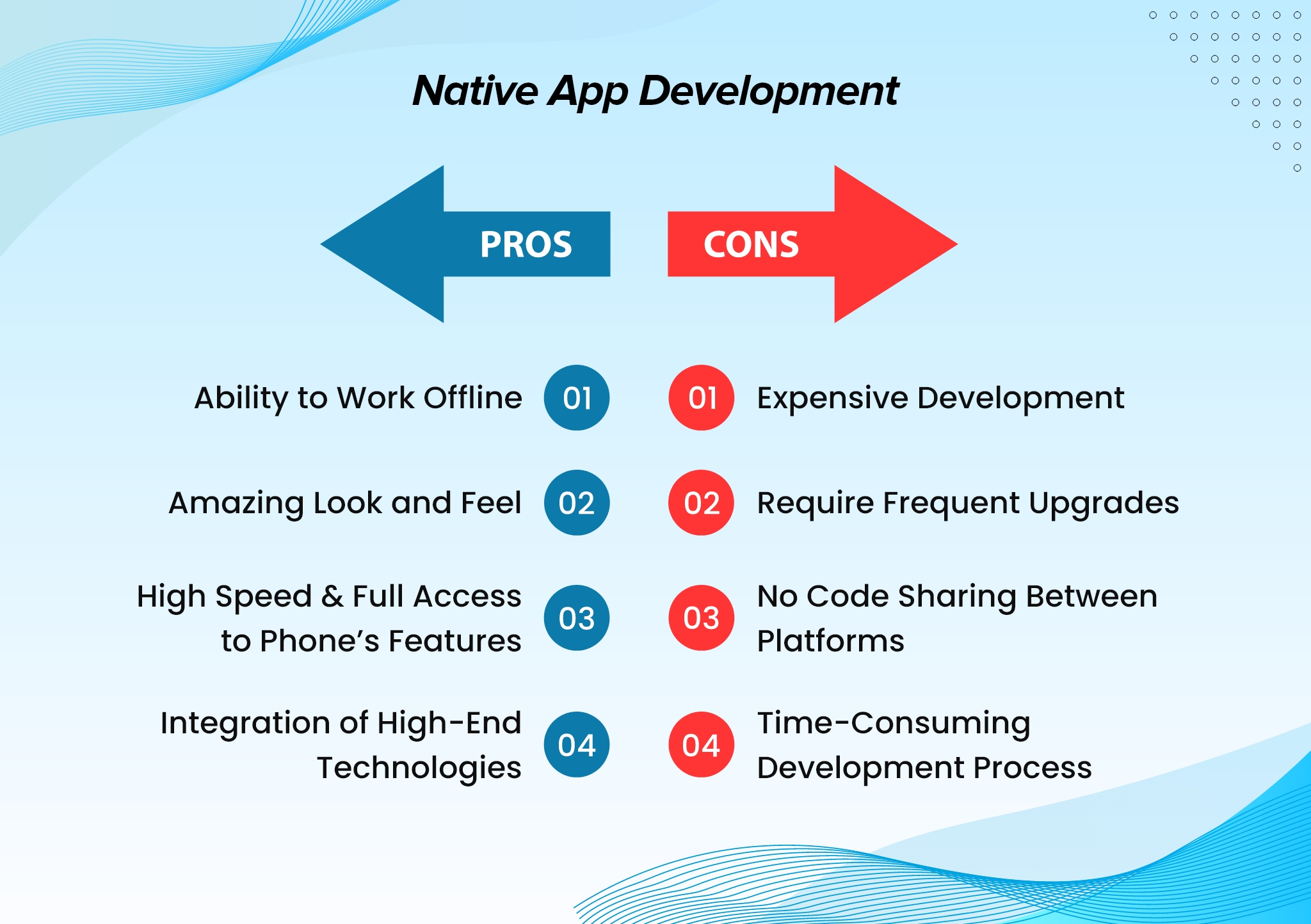
The performance a native application provides is top-notch and the level of control you have over the mobile phone’s internal features is amazing with apps developed using native technologies like Java, Kotlin, Swift, and Objective C.
Plus, you will always be able to add complex features in a native app using high-end technologies like AR, VR, and Artificial Intelligence without losing its performance and speed.
However, native apps work for many businesses, not for all. Despite the fact that apps developed using native technologies are fast, scalable, and blend with the device’s features seamlessly, there are a number of challenges that come along with these apps including high development cost, the frequent need for maintenance, and a time-consuming development process.
Now, let’s analyze the benefits and downsides of Cross-Platform App Development:
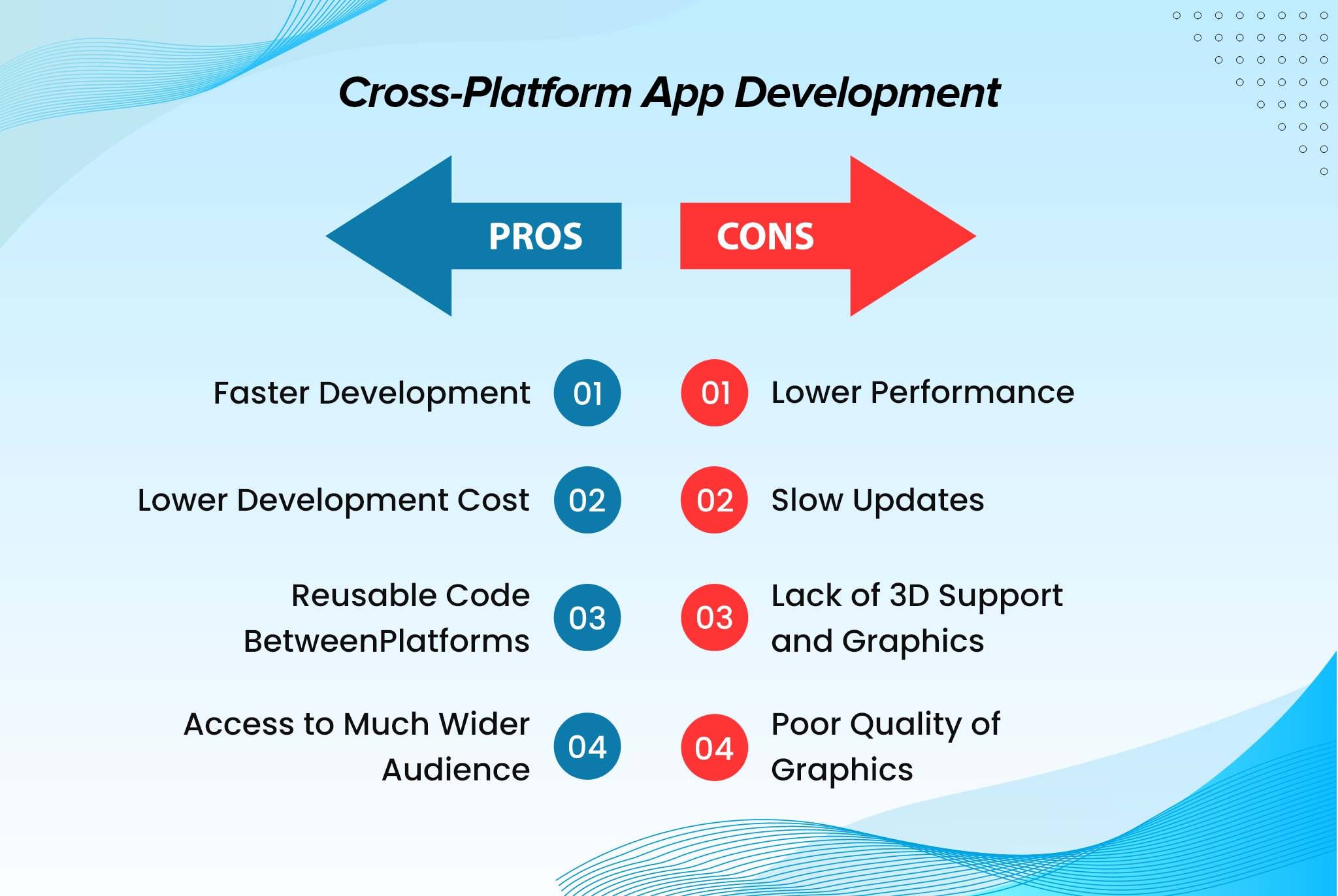
Cross-Platform App Development is an amazing option for brands who are planning to test their business idea or develop an MVP. This development model reduces the cost to a significant amount and allows you to target a wider audience right after you launch your app.
But, just like native apps, it is not a viable option for all. Businesses that need to integrate high-end technology and features in their apps, have to deal with complexity and poor performance if they choose this development model. Thus, to make an informed decision, businesses shall analyze their requirements and goals from all perspectives before they choose one of the above-mentioned options.
How to Choose Between Cross Platform and Native App Development?
To make the right decision, here are three questions you need to ask yourself:
1. What Is Your Ultimate Goal Behind Mobile App Development?
The tech stack you select for developing your mobile app must be decided on the basis of your ultimate goal behind developing the application. For example, if you are a startup and just want to validate your idea or acquire early users of your product, a cross-platform approach would be beneficial for you.
React Native and Flutter are two popular cross-platform mobile app development frameworks that are cost-effective and allow startups to launch apps on iOS as well as Android platforms using a single codebase. It means faster development and less cost — a win-win for the startup ecosystem. If you just want to validate your idea and build an MVP, go with hybrid or cross-platform app development.
On the other hand, however, if you are an established business with a proven business idea and you are planning to scale your app immediately after you launch it, native-approach would be beneficial for you.
2. Do You Have a Team of In-House Developers or You Are Planning to Outsource?
Your most important asset while developing your product will be your team of developers. So, before you select a framework, you need to find what skills your in-house team of developers possesses. And, do you need to hire people from outside to help you with your project? If yes, are you ready for the same?
If you are planning to create an app using the native development kit, keep in mind you won’t find many developers skilled enough to do that job efficiently. As per Statista, only 4.1% of the developers use Objective-C, 5.9% of developers are skilled in Swift, and just 7.8% use Kotlin.
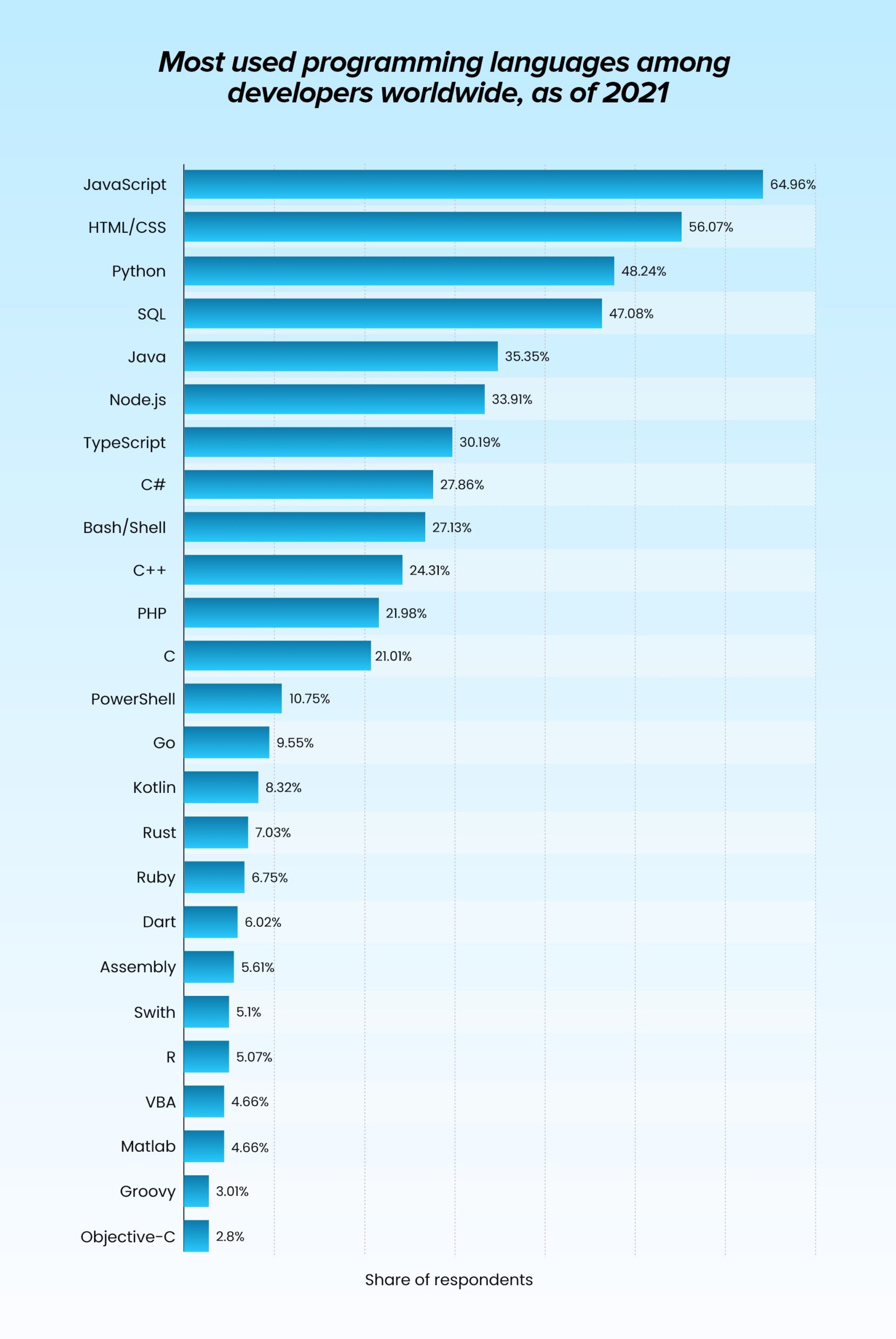
Moreover, if you are in any Western country, hiring a native developer would cost you around $50-$80 per hour. It would be an expensive option in terms of money as well as time. Your best option, in this case, would be to outsource your project to skilled Asian developers. Ask yourself, are you ready for the same? If yes, you should go with native mobile app development.
Otherwise, cross-platform app development is always an option. There are several mobile app development frameworks like React Native, Flutter, Xamarin, and Ionic that will allow you to build native-like apps using Javascript and C# — the world’s most popular programming languages. You might have developers skilled in these languages in your in-house team or you can easily find one at reasonable prices.
3. What Mobile App Features are You Planning to Integrate?
Depending on what features your need for your application, the choice of tech stack or the mobile app development frameworks changes. With native applications, you can access the functions and features of modern mobile devices.
Native applications permit utilizing device features like GPS, cameras, microphones, and numerous others. As opposed to it, cross-platform applications can call just SQLite database and subsequently limit the functionality. Thus, if your app needs to access device features, go for native app development.

Native Mobile App Development: What Options Do I Have?
Now if you are done choosing between native and cross-platform app development, you are halfway there in the journey of selecting the right tech stack for your mobile application. But, there is still a long way to go and a lot of decisions to be made.
For example, if you choose to develop a native mobile application due to its robust and high-performing nature, you will have to decide the platform you want to target first. Whether you want to develop for Android or iOS is a crucial decision and should be backed by strong research. Depending on the platform, you will have to choose the technology stack. Let’s see what options you have and how you should decide between them:
Android App Development Technology Stack
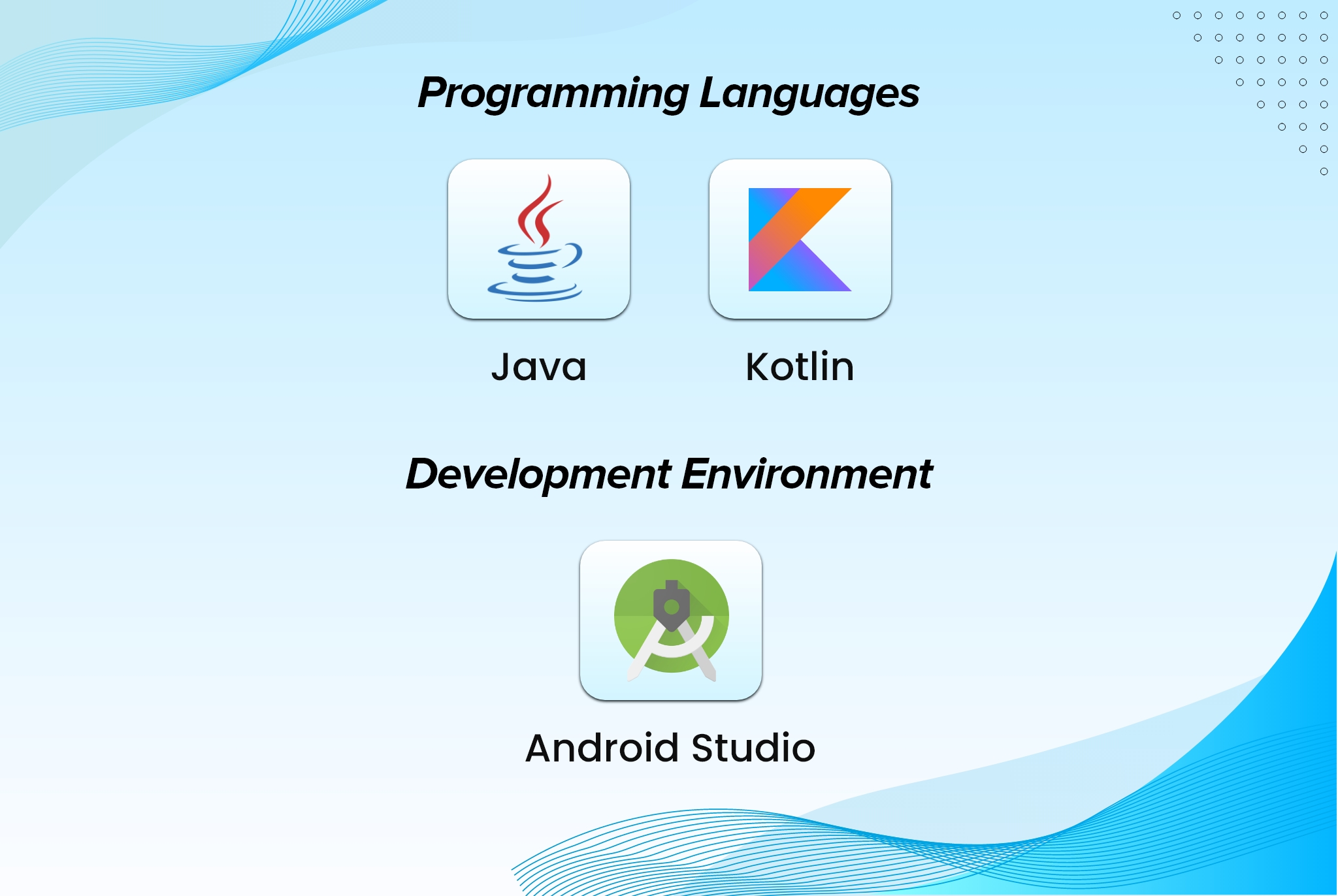
Programming Languages
- Java
Developing an Android application is not a walk in the park. You need to have developers proficient in Java or Kotlin – two of the most popular programming languages used for creating Android apps. Java is an enterprise-level language that makes the job of developing apps easy as it is based on Android API. Using Java, you can develop high-performing apps even if you plan to integrate some high-end technologies later on.
- Kotlin
While Kotlin is less popular and lightweight than Java, it is also an amazing programming language that offers top-notch capabilities to develop robust applications for the Android platform. Though Java is just limited to object-oriented programming, Kotlin merges the features of functional programming with object-oriented programming and provides amazing functions.
Also Read: Java vs Kotlin: Which is the Best Programming Language for Android App Development?
Android Development Tools
- Android Studio
Android Studio is the development environment for Google’s Android OS. When developing apps for Android, you will need Android Studio which is specifically designed for coding Android apps. It includes all the crucial debugging features, code editing tools, and visual layouts.
- Android Development Tools (ADT)
Along with crucial coding and debugging tools, ADT provides specific coding and testing support to developers. It is a well-designed and maintained tool that offers a robust and integrated environment to develop Android apps fast and effectively.
Android SDK
To write accurate and high-quality code, the programmers require to download and install every rendition of SDK for a particular phone.
Utilizing this Android tech stack, developers have made millions of mobile applications that are now up and running on the play store. The user base of the Android operating system is so large that it is always advisable to create apps for Android if you want to want to develop a native application that serves the masses.
iOS App Development Technology Stack
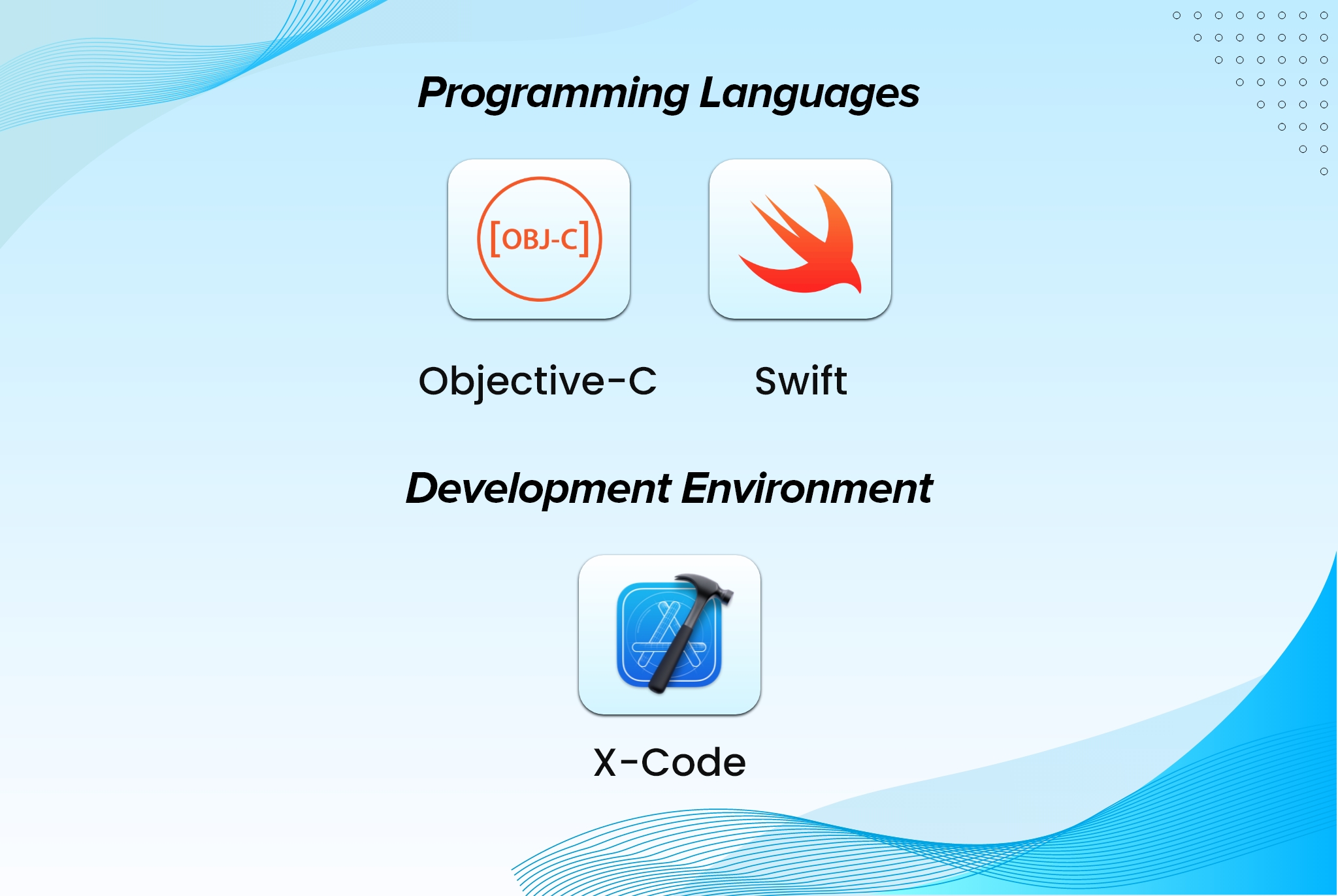
Programming Languages
- Objective-C
Objective C is a programming language supported by Apple for the development of iOS apps. It has a dynamic runtime environment and provides object-oriented capabilities. But, due to its complex nature and absence of templates in it, a lot of developers now use Swift over Objective-C.
- Swift
Swift is a high-level programming language and apps developed in Swift offer high-performance and ensure top-notch security. It is a new language as compared to Objective-C but doesn’t have any string identifies that result in fewer errors while coding. Presently, Swift is the most popular programming language for iOS App development owing to its speed, simplicity, and readability.
iOS Development Tools
- Xcode
Xcode is an integrated development environment supported by Apple and it offers all the essential features to develop an iOS app. Moreover, it also provides developers with crucial functionality for UI design, testing, and coding.
- Appcode
Another IDE for the development of iOS apps, Appcode is supported by a third-party organization. But, it provides the required flexibility that helps developers increase their productivity.
UI Frameworks
- UIKit
It is a basic framework for developing and managing graphical elements in an iOS application.
- SwiftUIM
It is a lot like UIKit, and the two of them can connect. However, as SwiftUI came later, it upholds only the high-level versions of iOS. Thus, by applying the SwiftUI framework, the designers can lock the users from utilizing older versions of iOS.
So, that was the tech stack for Native app development. If you want to develop an app for iOS or Android natively, you will have to choose a programming language and development environment that best suits your needs and the developer’s preferences. Now let’s see what options you have if you decide to go with cross-platform app development.
Cross-Platform App Development: Which Is The Best Mobile App Development Framework?
Here are some of the most popular mobile app development frameworks available for developing cross-platform apps:
1. Flutter
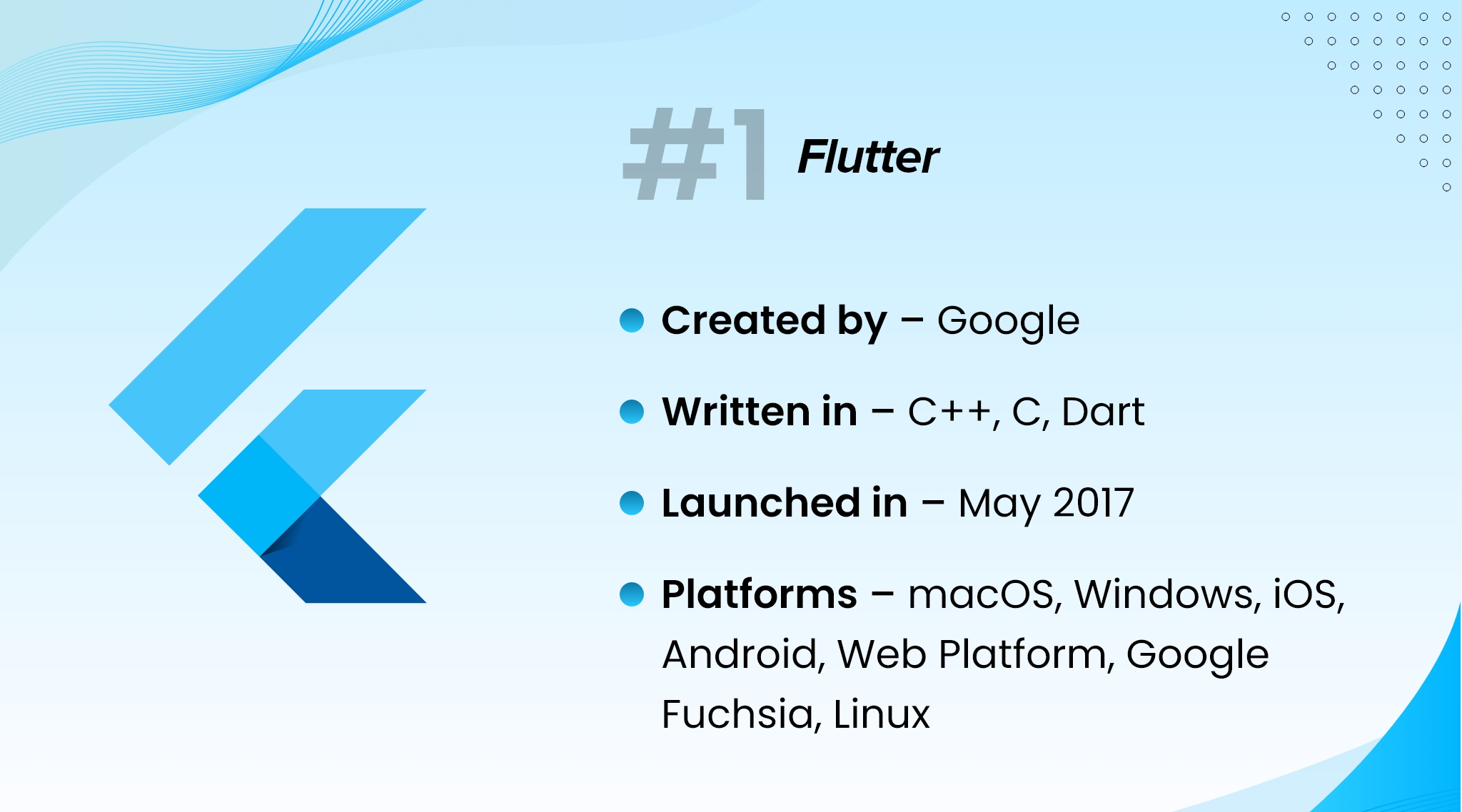
When talking about developing cross-platform apps, Flutter is the number one framework that comes into mind. Especially, if you are a startup, Flutter’s features will help you a lot in developing and launching mobile apps. It is an open-source framework that makes compiling the native code easy with the end goal to deliver apps that have a native-like look and feel.
Developed and Maintained by Google, it is based on Dart programming language that makes apps run smoothly on iOS as well as Android operating systems. The major benefits of Flutter include flexible UI, fast speed, lightweight, and native-like performance. If you are planning to develop an MVP, look no further than Flutter to avail maximum benefits.
2. React Native
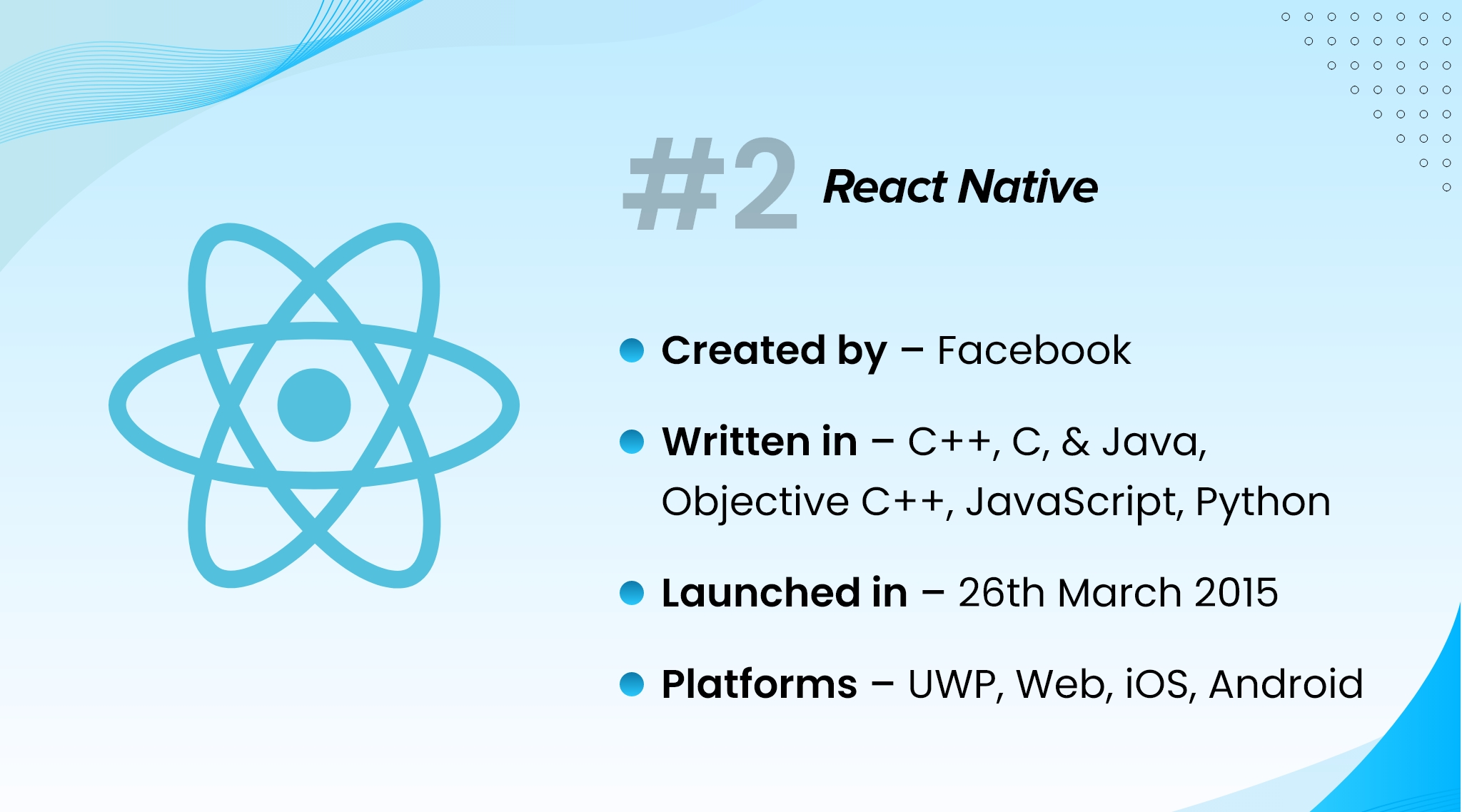
Developed and maintained by Facebook, React Native is another great cross-platform mobile app development framework with amazing capabilities. It lets you develop mobile apps offering native-like performance using Javascript and React.
There are several reasons why React Native is preferred for developing cross-platform apps including its modular architecture, stability, optimal performance, and shared codebase. As per various developers, around 90% of the codebase can be shared between iOS and Android when developing apps using React Native.
It has amazing features like Hot Reload that accelerate development and let developers shorten the app’s time to market. The biggest competitor of Flutter, React Native is also cost-effective and allows plugins from third parties to develop apps with the desired look and feel.
Also Read: React Native vs Flutter: Which is Best?
3. Xamarin
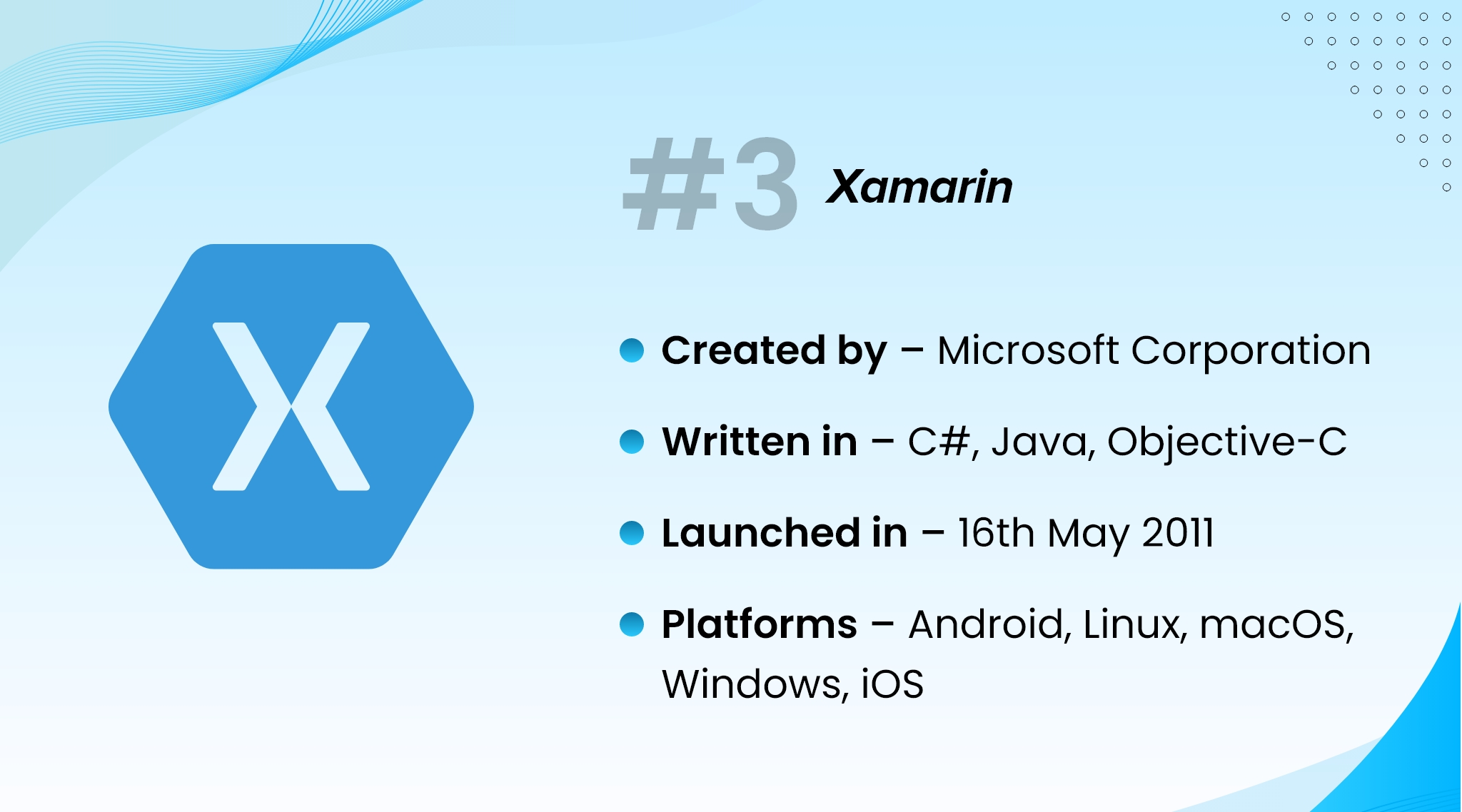
Xamarin is a Microsoft-powered open-source platform that is good for developing native-like cross-platform apps. Just like Flutter and React Native, Xamarin developers can also use the same codebase for developing apps on different platforms.
It can be used to develop amazing native UIs and a flawless user experience. There are numerous benefits of using Xamarin as your Cross-Platform Mobile App Development Framework including a less complex environment, easy API integration, and support of a huge community.
4. Ionic
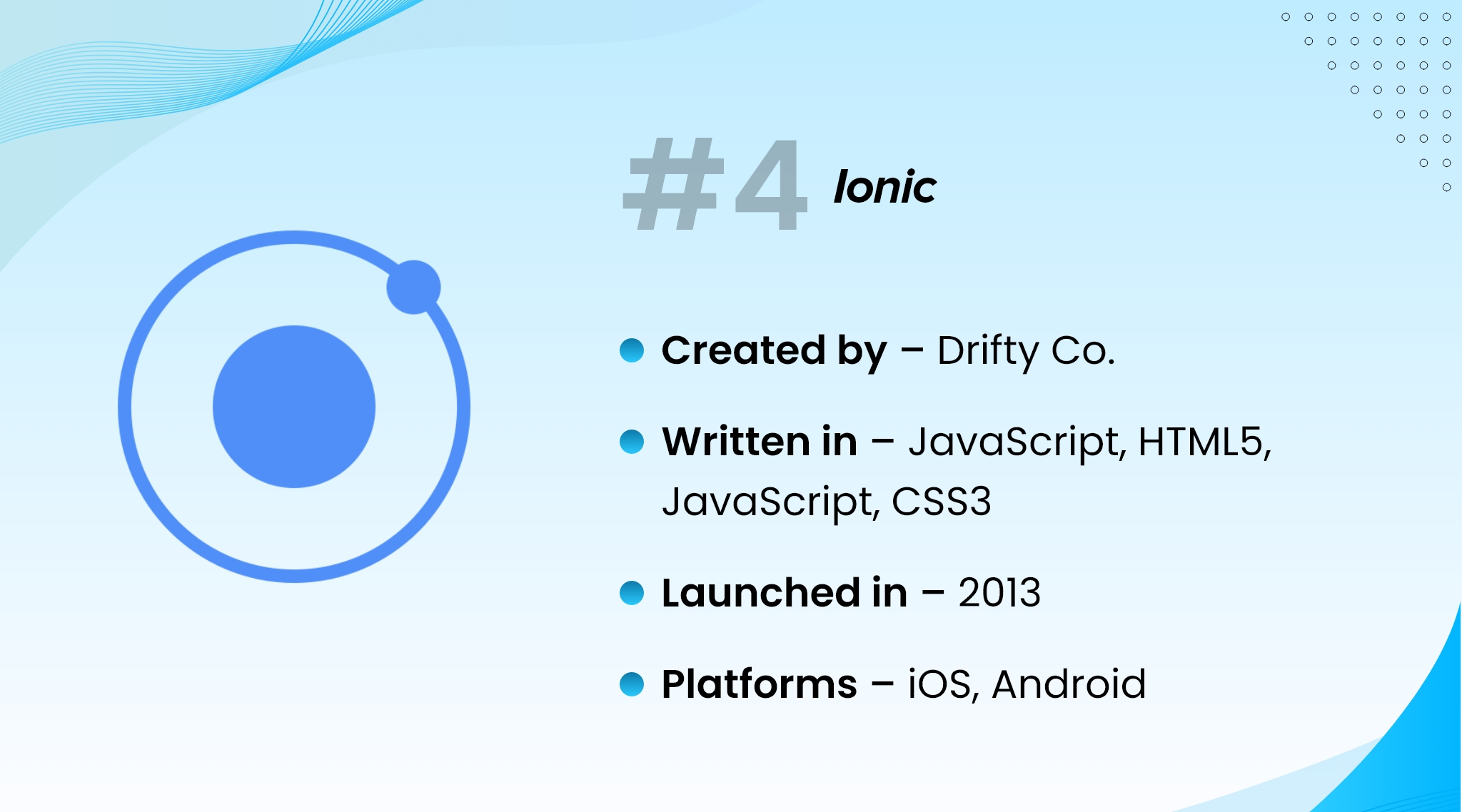
The Ionic cross-platform app development tool is used to combine CSS, Javascript, and HTML to make the app development process easier and less time-consuming. The main advantages of developing apps using Ionic include fast time-to-market, native-like performance, Cordova plugins, and easy to understand app development process. Ionic can be best used for PWA development.
So, Which is the Best Cross-Platform App Development Framework?
While there is no one-word answer to this question, all we can say is it depends. Selecting the right framework for developing a mobile app depends on a lot of factors like business goals, timeline, app development budget, and developer’s expertise.
But, if you want to compare, here is your ultimate guide on Which Cross-Platform App Development Framework is Best for You. In this guide, we tried to list all the features and differences of these frameworks that will help you make your selection process easier and less confusing. If you want further assistance on selecting the technology stack for your app, you can contact our experts right here.
4 Things to Avoid While Selecting the Right Tech Stack
A number of budding entrepreneurs fail to develop a profitable mobile app because of not selecting the right technology stack. Here are a few mistakes you should avoid during the process:
1. Imitating Competitors
To a large extent, assessing your competitor’s offering is a good strategy. However, you simply cannot clone their entire technology stack while developing any software product.
Every product is powerful. If you want to outperform your competitors, you must create a superior product. However, you won’t be able to create a superior one if you use the same tech stack as your competitor.
2. Personal Choices
Many individuals give preference to their personal choices while choosing a tech stack for mobile app development. But, Alas! This method works in the favor of tech-savvy people only. So, if you are an amateur in the world of mobile development, this method will not work for you.
3. Copying Tech Trends Blindly
It’s easy to get excited about innovative technologies. But, you should not forget to double-check their compatibility with your mobile app requirements. Hence, investigate thoroughly a tech stack suitable for your business and not just follow trends.
4. Online Research
Since limitless surveys, studies, reports, and comparisons are available online, it’s easy to get perplexed by the internet. But, you can not blindly rely on online information.
While researching online, you will probably come across many resources that are totally against your opinion. It can lead to errors in your decision-making and hence will give a faulty output. It’s always better to consult a professional rather than wandering online.
The Crux
It is clear that picking the right technology stack or mobile app development framework is no walk in the park. So, don’t simply rely on time-proven technologies even if some giants have used them. You should be reasonable and think about all benefits and downsides while researching your tech stack.
One wrong choice might lead you to failure which you will never desire. Thus, pass on the decision to professionals in case you are a novice in the application development world.

Rate this article!
(1 ratings, average: 5.00 out of 5)
Join 60,000+ Subscribers
Get the weekly updates on the newest brand stories, business models and technology right in your inbox.

Nikhil Bansal is the Founder and CEO of Apptunix, a leading Software Development Company helping startups as well as brands in streamlining their business processes with intuitive and powerful mobile apps. After working in the iOS app development industry for more than 10 years, he is now well-equipped with excellent problem-solving and decision-making techniques.

Telemedicine 2.0 - A Comprehensive Guide On What Healthcare Providers Need To Know?
Discover how the latest advancements like Artificial Intelligence in telemedicine are reshaping patient care. This comprehensive resource offers insights into the key trends and innovations driving this shift, providing valuable knowledge for healthcare professionals looking to stay ahead.
Download Now!Take the First Step
Towards Success!
Master app development with a
30-day FREE trial of our premium
solutions.


















